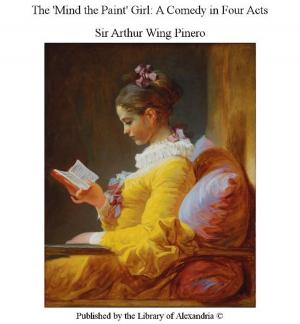Isabella Orsini: A Historical Novel of the Fifteenth Century
Nonfiction, Religion & Spirituality, New Age, History, Fiction & Literature| Author: | Francesco Domenico Guerrazzi | ISBN: | 9781465617675 |
| Publisher: | Library of Alexandria | Publication: | March 8, 2015 |
| Imprint: | Language: | English |
| Author: | Francesco Domenico Guerrazzi |
| ISBN: | 9781465617675 |
| Publisher: | Library of Alexandria |
| Publication: | March 8, 2015 |
| Imprint: | |
| Language: | English |
The first draught never intoxicates, and whoever wishes, can put down the cup and say, "Enough!" For that Love, hardly born, shaking his head and his great bow, enthrones himself king of the spirit, and cries, "I will it, and I wish to reign alone,"—so sing the fanciful poets,—but this is not the truth. Love every moment makes his wings of sweet thoughts and ardent desires, and his darts grow harder, as the heart at which he aims becomes softened. Delia did not become blind merely by once looking at the sun; and whosoever wishes to escape the Sirens must imitate the example of Ulysses, and stop his ears with wax. We trust too much or too little to ourselves. When the flame of a glance, or the allurement of a voice fascinates us, and Providence with an innate conscience admonishes us, we take no heed of the warning, but say: "Not even this love shall trespass; when it would go beyond bounds, we shall be sufficient for the defence." When afterwards we feel it conquering, we defer the remedy from day to day; at last, overcome, we accuse the destiny which we have woven with our own hands. Thus, having the power, the will fails, and having the will, the power fails. We are caught in our own nets. Among the laws of fate, man can be subjected to those that are outside; the others that are within him have no power; the body can be subdued, not the soul. And if God gives us a mind able to use its power even against His immortal throne, why or how can we accuse Him, if, like cowards, we throw down the shield at the beginning of the battle, or if we refuse to use the sword which He has put into our hands? Querulous and unjust atoms, we wish the Creator to break through the eternal order of things, and to bend down every moment from the heavens to repair our faults, and to quiet the tempest of the heart which we have excited. He, the Creator, who whirls through infinite space the fragments of shattered orbs, and wakes in its dreadful sublimity the tempest of the ocean! Even guilt knows a kind of dignity; let us dare to possess it. Lucifer, exiled from celestial thrones, accused no one, nor did he reproach himself with his want of success; and Lucifer, in his dark grandeur, appears such, that although we cannot wish him a better destiny, yet we cannot abstain from cursing the ill-omened moment in which he drew down upon his head the wrath of God. But we are far inferior either in good or evil to angelic natures. In order to persuade ourselves that we are worth something, we presume to do ourselves the honor of believing that Satan has tempted us. If Satan could turn upon us his fiery glances, he would not tempt, but laugh at us. Can there be a worse tempter than our own evil inclinations, and the full power of our will in nursing and fostering them? I certainly do not wish to take away or to diminish the compassion of men, or the mercy of God for the poor soul of Isabella, but only to prove that the miserable death to which she was brought was the just recompense of her merits, or rather her demerits.
The first draught never intoxicates, and whoever wishes, can put down the cup and say, "Enough!" For that Love, hardly born, shaking his head and his great bow, enthrones himself king of the spirit, and cries, "I will it, and I wish to reign alone,"—so sing the fanciful poets,—but this is not the truth. Love every moment makes his wings of sweet thoughts and ardent desires, and his darts grow harder, as the heart at which he aims becomes softened. Delia did not become blind merely by once looking at the sun; and whosoever wishes to escape the Sirens must imitate the example of Ulysses, and stop his ears with wax. We trust too much or too little to ourselves. When the flame of a glance, or the allurement of a voice fascinates us, and Providence with an innate conscience admonishes us, we take no heed of the warning, but say: "Not even this love shall trespass; when it would go beyond bounds, we shall be sufficient for the defence." When afterwards we feel it conquering, we defer the remedy from day to day; at last, overcome, we accuse the destiny which we have woven with our own hands. Thus, having the power, the will fails, and having the will, the power fails. We are caught in our own nets. Among the laws of fate, man can be subjected to those that are outside; the others that are within him have no power; the body can be subdued, not the soul. And if God gives us a mind able to use its power even against His immortal throne, why or how can we accuse Him, if, like cowards, we throw down the shield at the beginning of the battle, or if we refuse to use the sword which He has put into our hands? Querulous and unjust atoms, we wish the Creator to break through the eternal order of things, and to bend down every moment from the heavens to repair our faults, and to quiet the tempest of the heart which we have excited. He, the Creator, who whirls through infinite space the fragments of shattered orbs, and wakes in its dreadful sublimity the tempest of the ocean! Even guilt knows a kind of dignity; let us dare to possess it. Lucifer, exiled from celestial thrones, accused no one, nor did he reproach himself with his want of success; and Lucifer, in his dark grandeur, appears such, that although we cannot wish him a better destiny, yet we cannot abstain from cursing the ill-omened moment in which he drew down upon his head the wrath of God. But we are far inferior either in good or evil to angelic natures. In order to persuade ourselves that we are worth something, we presume to do ourselves the honor of believing that Satan has tempted us. If Satan could turn upon us his fiery glances, he would not tempt, but laugh at us. Can there be a worse tempter than our own evil inclinations, and the full power of our will in nursing and fostering them? I certainly do not wish to take away or to diminish the compassion of men, or the mercy of God for the poor soul of Isabella, but only to prove that the miserable death to which she was brought was the just recompense of her merits, or rather her demerits.















